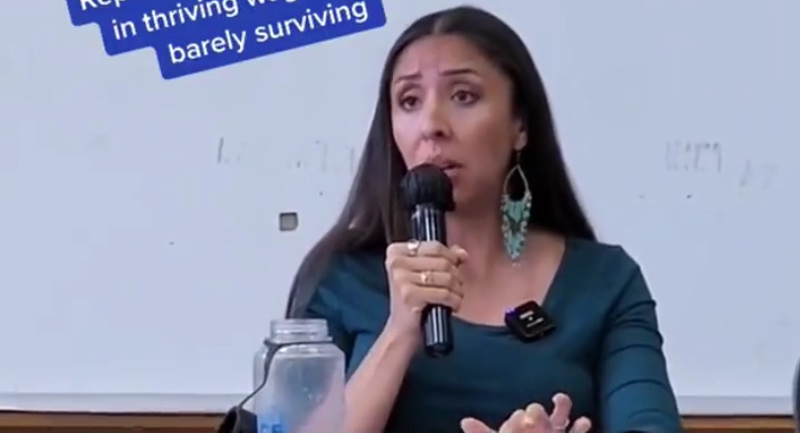"It's basically flooded [CdeBaca's] social media with a bunch of white nationalists," says a source, noting how most of the vitriol was coming from people who caught wind of CdeBaca's reparations idea through a tweet on the popular right-wing account "Libs of TikTok."
The incumbent councilwoman — and self-described Democratic socialist, who's facing a challenger in the June 6 runoff — was speaking at the Greater Metro Denver Ministerial Alliance Forum on May 4 when she brought up the idea. Video of the council rep talking about taxing white-owned businesses was posted on CdeBaca's social media channels and then reshared by Libs of TikTok on Twitter, where it's been watched more than two million times.
"Denver City Council member Candi CdeBaca, who is running for re-election, says white owned businesses should be taxed extra and redistributed to black owned businesses," tweeted Libs of TikTok.
“Capitalism was built on stolen land, stolen labor and stolen resources," CdeBaca said during the forum.
"And a check today could not undo the cumulative impact of generations of that stolen wealth in all of those categories," she added. "So I think it has to come in the form of land, labor and resources in an ongoing fashion. And there are structures that we have that could be flipped to begin to do reparations. In fact, my opponent here mentioned Five Points and the corridor and what has happened to our businesses there. Part of what has catalyzed that exponential decimation of Black businesses is the Five Points BID — the Business Improvement District — which further steals from the community through taxation. And I think there's a model that could be redistributive."
Added CdeBaca: "Instead of a BID collecting extra taxation from Black and brown businesses that are struggling, you could be collecting those extra taxes from white-led businesses all over the city and redistributing them to Black- and brown-owned businesses, who are not part of the BID, or are simply just Black or brown owned. And that’s one way to give back in the business form fashion. I think when we talk about resources being returned, this is where consumer-owned or municipally-owned resources are important. Because we are locked out of owning our control over our basic needs like water or utilities or any of those things. There is a way for us to change that structure and put Black and brown people in ownership positions over our basic needs."
"The goal of reparations should not be about survival, it should be about repairing the harm, which is this entire economy," she added.
Taking on Denver's Basic Income Project — which is supposed to give basic income to individuals experiencing homelessness or financial strife with the goal of "building a healthier society," according to the official website — CdeBaca said the project could be an important way to "return a check to an individual in an ongoing fashion" if it were actually focused on helping people get reparations.
"In its current format, [Denver's Basic Income Project] is not reparations or not close to reparations," CdeBaca said. "One, it doesn't focus on Black or brown people. Two, what they are experimenting with is unhoused people, and it's not a livable or prosperous wage; it is a welfare wage. And we know how that has worked: Those types of checks have not served us well, and we need to go far beyond welfare wages and go to prosperous wages, because we don’t want to just survive anymore. And reparation’s goal should not be survival; it should be repairing the harm, which is this entire economy."
The backlash came quickly.
"I will not be silenced by the far-right playbook," CdeBaca says in response. "A nuanced discussion about reparations is necessary, but that opportunity has been taken from us by the right-wing outrage machine. This kind of discussion is not going to happen in this media landscape."
CdeBaca's campaign crew describes Libs of TikTok as a "far-right outrage machine" known for creating "echo chambers of violent and dangerous rhetoric around cherry-picked clips of everyone from private citizens to elected officials." It's now "the third time CdeBaca has been targeted by a white nationalist mob," it adds in a statement.
"This once again shows just how difficult it is to be a progressive woman of color in politics. Nevertheless, she will continue being the voice of the people and delivering for District 9 just as she’s done the past four years," the statement continues.
CdeBaca was recently accused of not showing attention to Denver's Black community after she was unable to attend multiple meetings organized by Black leaders. Longtime political consultant John Bailey blasted her for being a "no show" for two runoff candidate forums he hosted with the Black community.
In an email titled "YOU DON'T HAVE THE TIME FOR US - WE WON'T SUPPORT OR VOTE FOR YOU," Bailey — founder of the Black Cannabis Equity Initiative — called out CdeBaca for not being able to "find the time to meet with our Black community collaboration of leaders and concerned citizens."
Bailey said that when CdeBaca was asked to appear at the candidate forums, scheduled for two Saturdays at New Hope Baptist Church, she declined. According to CdeBaca, she couldn't make the meetings because of the short notice.
"[Bailey] reached out to me after dates were scheduled with only a week's notice in the middle of a runoff," she said, adding that there was "no effort to collaborate on a time that works, no courtesy of a request for dates that work."
According to CdeBaca's campaign, the councilwoman is being "strategically targeted and harassed, despite all candidates attending the forum agreeing to some kind of racial reparations."












